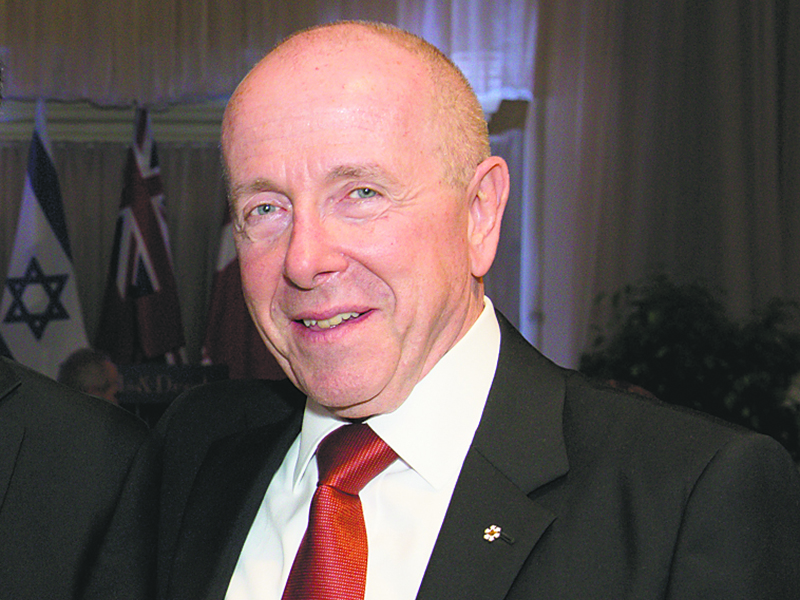In honour of Canada’s 150th birthday, The CJN presents 40 profiles of some of the most prominent Jewish Canadians throughout our history.
Larry Tanenbaum probably won’t like this article.
More accurately, he’ll shun the publicity. As his old friend Paul Godfrey once observed, Tanenbaum “looks for no personal credit. He is shy about getting his name in the paper.”
It’s an incongruous trait for someone described in Toronto Life this way: “No one has greater sway over Toronto sports than Larry Tanenbaum.” Indeed, as chairman of Maple Leaf Sports and Entertainment (MLSE), Tanenbaum oversees almost every professional sports team in Toronto: the Maple Leafs, Raptors, Argos, TFC and the Marlies.
He serves as a governor of the NHL, the NBA and Major League Soccer, and is a member of powerful executive committees for each league.
Often described as a calm, quiet manager, the 72-year-old Toronto native is also a construction and investment tycoon, who serves as chairman and CEO of Kilmer Van Nostrand Co. Ltd., a multi-faceted civil engineering construction company headquartered in Toronto’s Scotia Plaza.
READ: THE CJN’S SPECIAL COVERAGE OF CANADA’S SESQUICENTENNIAL
He owns a 25 per cent stake in MLSE, through his holding company, Kilmer Sports Inc. The other 75 per cent is split evenly between Bell Media and Rogers Communications. In 2015, Kilmer announced it had acquired an ownership stake in the Toronto Argonauts, in partnership with Bell Media.
A 2008 book titled, Jews and the Sporting Life, says that Jewish owners of sports teams “have been open about their ethnic and religious ties” and many are leading benefactors. Tanenbaum, it said, was no different.
He’s served on the board of directors at Mount Sinai Hospital and on the advisory board of the Baycrest Centre for Geriatric Care. He was also a founder of the Centre for Israel and Jewish Affairs and co-chaired the Tomorrow Campaign at United Jewish Appeal.
His net worth has been estimated by Canadian Business to be $1.53 billion.
In 2013, he made headlines when he donated $35 million to the Samuel Lunenfeld Research Institute, which was established in 1985 at Mount Sinai Hospital in Toronto and renamed the Lunenfeld-Tanenbaum Research Institute. Today, it is ranked in the top 10 biomedical research institutes worldwide.
It was Tanenbaum’s largest single philanthropic gift, and it was designed to attract further giving, with $15 million to be matched by other donors, to establish 15 research chairs.
Tanenbaum’s story began in 1911. According to family lore, the family’s patriarch, Abraham Tanenbaum, left Parczew, Poland, north of Lublin, for New York that year. Two Toronto-bound acquaintances from the same town persuaded Abraham to join them.
“Soon after arriving in Toronto, Abraham was driving a horse and cart through residential and industrial areas of the city in search of scrap metal. By 1914, on the eve of war in Europe, Abraham had saved enough to bring his wife, Chippa Sura, and two young sons, Joseph and Max, to join him in Toronto,” relates the online Jewish Virtual Library.
Abraham prospered and built the Runnymede Iron and Steel Company into a major steel fabrication firm and real estate empire. His son, Max (who established his own company, York Steel), had seven children, among them Larry, who studied economics at Cornell University.
Godfrey, a former Metro Toronto chairman who was instrumental in bringing a pro-baseball team to Toronto and is now president and CEO of Postmedia Network, recalled in a 2011 Toronto Star interview that Max Tanenbaum, Larry’s father, donated $100 to Godfrey’s first political campaign – and never asked for anything in return.
“Larry is very much a chip off the old block,” Godfrey said of Tanenbaum’s charitable works.
“It all goes back to the Tanenbaum family belief that if you take something out of the community like they have, you have to set the example for your children and your grandchildren; you have to give back.”
Tanenbaum was named an officer of the Order of Canada in 2007.


